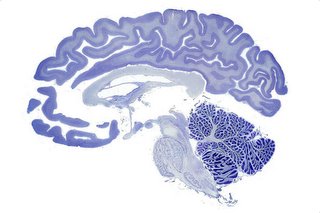Smack my bitch up
Nos leaders ont clamé, dans le tumulte post-11 septembre: ces gens-là ont attaqué notre mode de vie, ils haïssent la liberté, ils haïssent l'idée de sociétés qui laissent Dieu hors de la sphère publique.
Je les ai crus. Je les crois encore.
[...]
ben Laden a gagné.
Il a réussi à nous faire capoter, capoter bien raide. Il a réussi à nous pousser à avoir peur d'avoir peur, il a réussi à nous faire accepter un tas de trucs qui sont incompatibles avec une démocratie, avec une société ouverte.
[...] un cancer qui est dans le climat depuis le 11 septembre 2001. Un cancer sécuritaire qui nous fait accepter des choses odieuses.
La plus odieuse? La torture.
[...]
Pendant la guerre froide, c'était simple. Il y avait des bons et il y avait des méchants. Je caricature, bien sûr. L'Ouest, «nous». L'Est, mené par les Soviétiques.
Mais entre les deux camps, c'était facile de choisir. Des tas de gens de l'Est choisissaient, d'ailleurs. Ils faisaient - attention, mot vieillot, comme cassette Beta ou Walkman - défection. Il y a un bord, le nôtre, qui possédait une supériorité morale. L'autre possédait des goulags.
11 septembre: Ils ont gagné, Patrick Lagacé, 11 septembre 2007Apparently forgetting everything they once knew about US cold war misadventures, a startling number have begun to subscribe to an antihistorical narrative in which the idea of torturing prisoners first occurred to US officials on September 11, 2001, at which point the interrogation methods used in Guantánamo apparently emerged, fully formed, from the sadistic recesses of Dick Cheney's and Donald Rumsfeld's brains. Up until that moment, we are told, America fought its enemies while keeping its humanity intact.
The principal propagator of this narrative (what Garry Wills termed "original sinlessness") is Senator John McCain. Writing recently in Newsweek on the need for a ban on torture, McCain says that when he was a prisoner of war in Hanoi, he held fast to the knowledge "that we were different from our enemies...that we, if the roles were reversed, would not disgrace ourselves by committing or approving such mistreatment of them." It is a stunning historical distortion. By the time McCain was taken captive, the CIA had already launched the Phoenix program and, as McCoy writes, "its agents were operating forty interrogation centers in South Vietnam that killed more than twenty thousand suspects and tortured thousands more," a claim he backs up with pages of quotes from press reports as well as Congressional and Senate probes.
[...]
In Latin America the revelations of US torture in Iraq have not been met with shock and disbelief but with powerful déjà vu and reawakened fears. Hector Mondragon, a Colombian activist who was tortured in the 1970s by an officer trained at the School of the Americas, wrote: "It was hard to see the photos of the torture in Iraq because I too was tortured. I saw myself naked with my feet fastened together and my hands tied behind my back. I saw my own head covered with a cloth bag. I remembered my feelings--the humiliation, pain." Dianna Ortiz, an American nun who was brutally tortured in a Guatemalan jail, said, "I could not even stand to look at those photographs...so many of the things in the photographs had also been done to me. I was tortured with a frightening dog and also rats. And they were always filming."
Ortiz has testified that the men who raped her and burned her with cigarettes more than 100 times deferred to a man who spoke Spanish with an American accent whom they called "Boss." It is one of many stories told by prisoners in Latin America of mysterious English-speaking men walking in and out of their torture cells, proposing questions, offering tips.
'Never Before!' Our Amnesiac Torture Debate, Naomi Klein, 8 décembre 2007
Libellés : propagande
<body><!-- --><div id="flagi" style="visibility:hidden; position:absolute;" onmouseover="showDrop()" onmouseout="hideDrop()"><div id="flagtop"></div><div id="top-filler"></div><div id="flagi-body">Notify Blogger about objectionable content.<br /><a href="http://help.blogger.com/bin/answer.py?answer=1200"> What does this mean? </a> </div></div><div id="b-navbar"><a href="http://www.blogger.com/" id="b-logo" title="Go to Blogger.com"><img src="http://www.blogger.com/img/navbar/1/logobar.gif" alt="Blogger" width="80" height="10" /></a><form id="b-search" name="b-search" action="http://search.blogger.com/"><div id="b-more"><a href="http://www.blogger.com/" id="b-getorpost"><img src="http://www.blogger.com/img/navbar/1/btn_getblog.gif" alt="Get your own blog" width="112" height="10" /></a><a id="flagButton" style="display:none;" href="javascript:toggleFlag();" onmouseover="showDrop()" onmouseout="hideDrop()"><img src="http://www.blogger.com/img/navbar/1/flag.gif" name="flag" alt="Flag Blog" width="55" height="10" /></a><a href="http://www.blogger.com/redirect/next_blog.pyra?navBar=true" id="b-next"><img src="http://www.blogger.com/img/navbar/1/btn_nextblog.gif" alt="Next blog" width="72" height="10" /></a></div><div id="b-this"><input type="text" id="b-query" name="as_q" /><input type="hidden" name="ie" value="UTF-8" /><input type="hidden" name="ui" value="blg" /><input type="hidden" name="bl_url" value="themaybememe.blogspot.com" /><input type="image" src="http://www.blogger.com/img/navbar/1/btn_search_this.gif" alt="Search This Blog" id="b-searchbtn" title="Search this blog with Google Blog Search" onclick="document.forms['b-search'].bl_url.value='themaybememe.blogspot.com'" /><input type="image" src="http://www.blogger.com/img/navbar/1/btn_search_all.gif" alt="Search All Blogs" value="Search" id="b-searchallbtn" title="Search all blogs with Google Blog Search" onclick="document.forms['b-search'].bl_url.value=''" /><a href="javascript:BlogThis();" id="b-blogthis">BlogThis!</a></div></form></div><script type="text/javascript"><!--
var ID = 9954337;var HATE_INTERSTITIAL_COOKIE_NAME = 'dismissedInterstitial';var FLAG_COOKIE_NAME = 'flaggedBlog';var FLAG_BLOG_URL = 'http://www.blogger.com/flag-blog.g?nav=1&toFlag=' + ID;var UNFLAG_BLOG_URL = 'http://www.blogger.com/unflag-blog.g?nav=1&toFlag=' + ID;var FLAG_IMAGE_URL = 'http://www.blogger.com/img/navbar/1/flag.gif';var UNFLAG_IMAGE_URL = 'http://www.blogger.com/img/navbar/1/unflag.gif';var ncHasFlagged = false;var servletTarget = new Image();
function BlogThis() {Q='';x=document;y=window;if(x.selection) {Q=x.selection.createRange().text;} else if (y.getSelection) { Q=y.getSelection();} else if (x.getSelection) { Q=x.getSelection();}popw = y.open('http://www.blogger.com/blog_this.pyra?t=' + escape(Q) + '&u=' + escape(location.href) + '&n=' + escape(document.title),'bloggerForm','scrollbars=no,width=475,height=10,top=175,left=75,status=yes,resizable=yes');void(0);}
function blogspotInit() {initFlag();}
function hasFlagged() {return getCookie(FLAG_COOKIE_NAME) || ncHasFlagged;}
function toggleFlag() {var date = new Date();var id = 9954337;if (hasFlagged()) {removeCookie(FLAG_COOKIE_NAME);servletTarget.src = UNFLAG_BLOG_URL + '&d=' + date.getTime();document.images['flag'].src = FLAG_IMAGE_URL;ncHasFlagged = false;} else { setBlogspotCookie(FLAG_COOKIE_NAME, 'true');servletTarget.src = FLAG_BLOG_URL + '&d=' + date.getTime();document.images['flag'].src = UNFLAG_IMAGE_URL;ncHasFlagged = true;}}
function initFlag() {document.getElementById('flagButton').style.display = 'inline';if (hasFlagged()) {document.images['flag'].src = UNFLAG_IMAGE_URL;} else {document.images['flag'].src = FLAG_IMAGE_URL;}}
function showDrop() {if (!hasFlagged()) {document.getElementById('flagi').style.visibility = 'visible';}}
function hideDrop() {document.getElementById('flagi').style.visibility = 'hidden';}
function setBlogspotCookie(name, val) {var expire = new Date((new Date()).getTime() + 5 * 24 * 60 * 60 * 1000);var path = '/';setCookie(name, val, null, expire, path, null);}
function removeCookie(name){var expire = new Date((new Date()).getTime() - 1000); setCookie(name,'',null,expire,'/',null);}
--></script><script type="text/javascript"> blogspotInit();</script><div id="space-for-ie"></div>
 Moi
Moi 
 La Patrie
La Patrie  La Santé
La Santé

0 Commentaires, commanditaires:
Publier un commentaire
<< Retour au paillasson